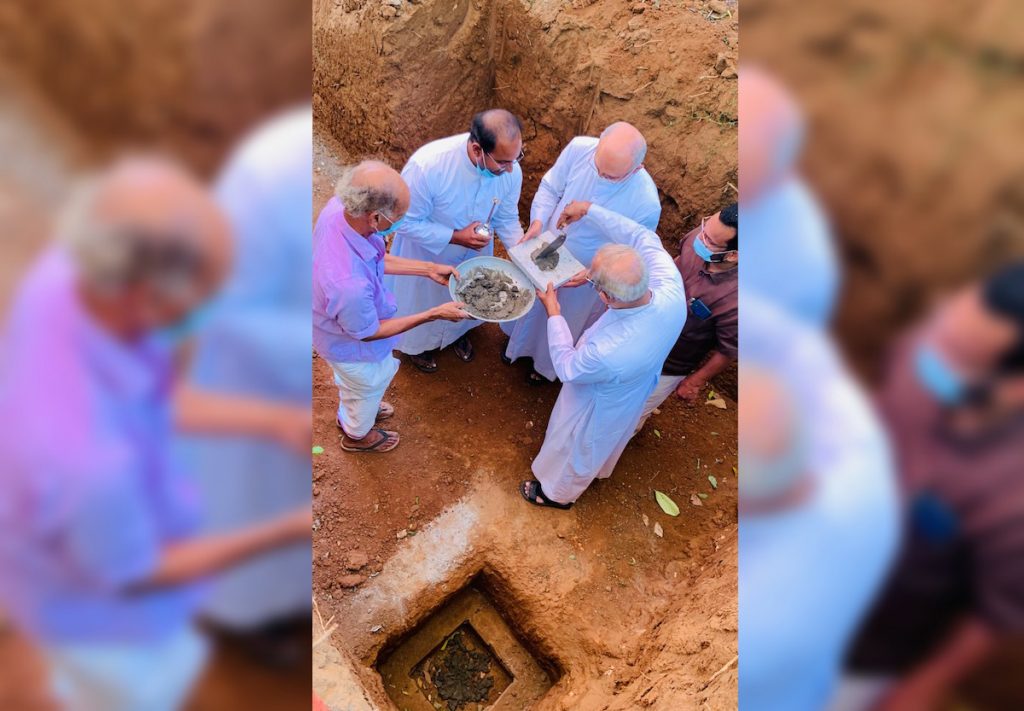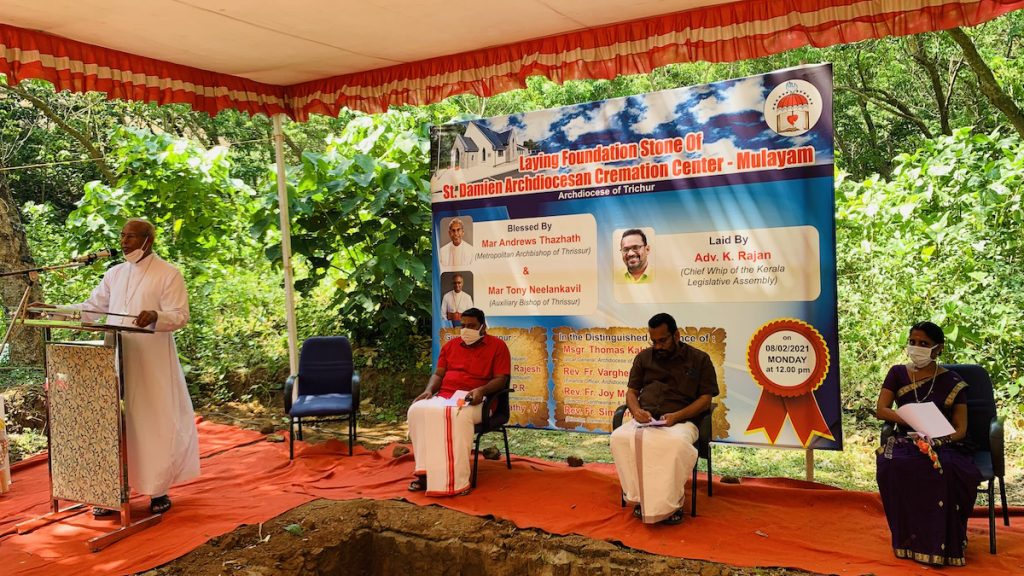In a break from tradition, a Catholic archdiocese under the eastern Syro Malabar rite is building a crematorium in India’s southern state of Kerala.
Necessitated by the pandemic and shrinking urban space, perhaps the first-ever crematorium for Catholics in India is set to begin operations at Mulayam in Thrissur district by June.
The foundation stone for the Damian Archdiocesan Cremation Centre was laid last month by Archbishop Andrews Thazhath of Thrissur, said Father Nyson Elanthanathu, Thrissur Archdiocese spokesperson.
“It is a novel concept for Catholics who bury their dead, but the pandemic and the protocols associated with interring the dead forced people to cremate those succumbing to COVID-19,” Father Elanthanathu said.
At first people were enraged at the idea of cremation like in the Hindu custom, said Bishop Pauly Kannookadan of Irinjalakuda Diocese.
“When I appealed to the faithful in my diocese last April to cremate COVID-19 victims, some people abused me on social media. They even made video clippings showing me being cremated, but they later understood how essential it was,” he said.
For deceased pandemic victims, the graves need to be dug 10 feet deep. That would disturb other graves as in some cemeteries there is not much space between two graves. This and related protocols made burial a bit difficult, so cremation was opted for, Bishop Kannookadan said.
According to the World Health Organization, the burial of COVID-19 victims poses the risk of a further outbreak via water sources while cremation kills the virus.
At least 160 Catholic COVID-19 victims, including Bishop Emeritus Joseph Pastor Neelankavil, who died on Feb. 17, were cremated in Kerala, said Father Elanthanathu.
Since the virus outbreak, sexagenarian Thresiamma Sebastian was the first to be cremated at St. Augustine Church cemetery in Mararikulum village in Alappuzha district in Kerala on July 27, 2020.


Latin rite churches in the state also advocated cremation of those who die from COVID-19.
Last April, Cardinal Oswald Gracias, who is also archbishop of Bombay, called upon the faithful there to cremate those who died from COVID-19.
Even before the construction of the cemetery started at least 26 bodies were cremated at the site, said Father Varghese Kuthur, Trichur Archdiocese Finance Officer, in charge of the crematorium project.
Father Kuthur said the one-acre land for the gas-based crematorium was donated by the Damian Institute, a leprosy center, in Mulayam, he said.
Damian Institute, Trichur director, Father Simson Chiramel said it is a part of the burial ground for churches that have no cemetery attached.
Traditionally all churches in Kerala had an attached burial ground but this is not possible now due to paucity of land and rising costs.
Father Chiramel said cremation is more economical and environment friendly besides saving space. He said “it would cost less as there was no need for land. No burial means no soil and water contamination.”
Father Kuthur said “though an electric crematorium is more ideal we opted for a gas-based one as the cost was much lower. Even this would cost roughly six million rupees ($82,189). We are working out modalities as this is something new and we are just learning the ropes.”
He said “in the final analysis cremation would cost less as we have some sponsorship and won’t have to recover the entire construction cost from those availing the facility.”
However, he said the cost of a cremation would be finalized only later.
The crematorium when ready would be open to all faiths, Father Kuthur added.
Bishop Kannookadan said his Diocese of Irinjalakuda was also planning to build a crematorium and awaiting necessary clearances from the government for the project.
More Christian crematoria may be established in the state and country if the pandemic persists. Cremation by Catholics is carried out in many countries, including Europe and the United States, the bishop said.
The instruction permitting cremation was incorporated into the Code of Canon Law in 1983 and the Code of Canons of the Eastern Churches in 1990, said Bishop Kannookadan.
The permission is granted on the condition that cremation is not done as a sign of denial of the basic Christian belief in the resurrection of the dead, he said.
Scattering of ashes in rivers etc, parting ashes out to friends and relatives, or keeping it at home is not allowed. The ashes have to be interred in a cemetery, Bishop Kannookadan said.
In keeping with the Catholic Church’s belief in the resurrection of the dead, the bodies of the deceased are to be treated with respect and laid to rest in a consecrated place, he added.


Cremation is a preferred option given the constraint on land, said theologian Virginia Saldhana from Mumbai, in the western state of Maharashtra.
“I too would prefer it be an option but not the norm,” said A.C. Michael, former member of Delhi Minorities Commission.
He said in Delhi more than a decade ago, the late Arnold James, then a member of the commission, had arranged with the authorities and the Church to allow the option of cremation for Christians due to non-availability of land.
But Gloria Menezes, a retired teacher, said that Christian tradition and sentiment demand burial.
“I don’t accept the idea,” Menezes said. “I don’t want my memory to be burnt out. I still visit my parents’ grave and want my children also to do so.”
For Dominic Gerald, a former seminarian and engineer, “a compromise with the scriptures is unthinkable.”
The 83-year-old said “we believe that on Judgement Day our souls join with the bones and appear before the seat of Judgment as a resurrected body. Cremation is against our doctrines.”
However, Nathalia John, a Catholic psychologist, said “the pandemic and space crunch are causing a grave crisis, a few years later we would have little choice but accept cremation as a mode to dispose our dear departed.”


